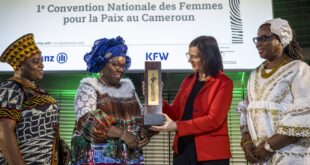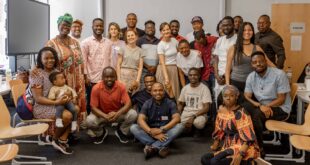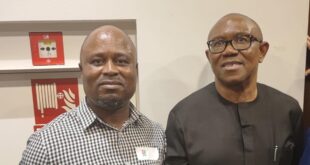The World Health Summit (WHS) took place recently in Berlin, Germany. Held between 16-18 October, 2022, it brought together people from Academia, Business and Government from over 140 countries to outline a road map for improving global health. Our Contributing Editor, Dr Michael Nnaji* attended the event and reports.
The Word Health Summit, which has just concluded in Berlin, Germany, brought together 60,000 participants online from over 140 countries with 2,500 on-site participants. Held between 16 and 18 October, it was the first time the summit was being co-hosted by the World Health Organization (WHO), the arm of the United Nations that coordinates public health among member states.
The World Health Summit, which has become one of the more important global health conferences, was founded by the Charité–Universitätsmedizin Berlin, one of Europe’s largest university hospitals, in 2009 to commemorate its 300th founding anniversary.
This year’s summit ran under the theme “Making Health a Political Choice”, a clarion call to governments to prioritize healthcare in their policy-making. Expectedly, the ongoing coronavirus pandemic and its impact on the delivery of healthcare was a dominant feature of the event.
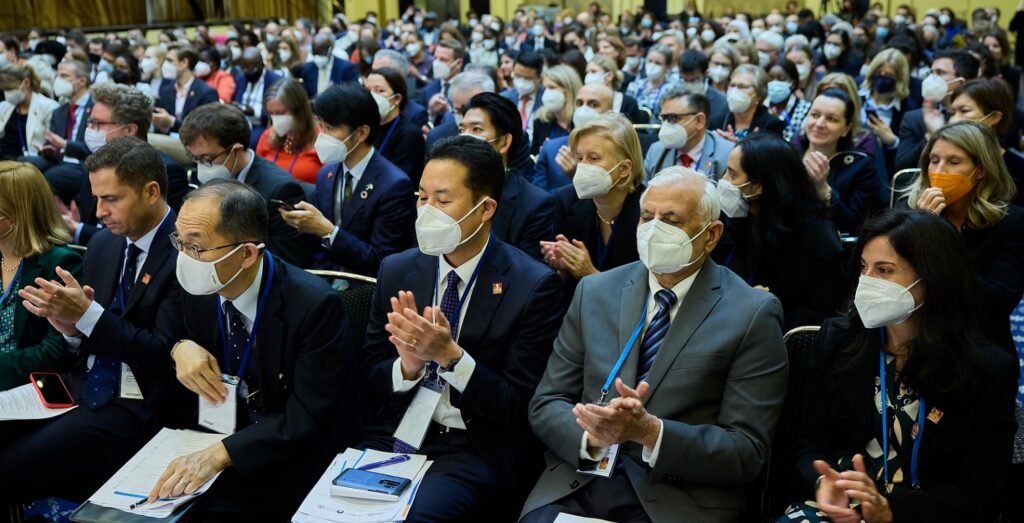
According to the website of the WHO, there had been over 600 million infections and over 6 million deaths worldwide caused by the virus. In contrast, the uptake of vaccines amounts to a comparatively paltry 12 billion, representing about 70% of the world’s population, despite huge governmental efforts in rolling out vaccines.
A bulk of the unvaccinated live, unsurprisingly, in low- and middle-income countries. This has been attributed not only to vaccine hesitancy, but also to the availability, distribution and utility of vaccines, especially in these countries.
Vaccine hesitancy, on the other hand, has been ascribed to the downside of social media, with unfounded theories of the ostensible harmful effects of the vaccines.
Major themes at the summit this year include the need for collaborative approaches for surveillance and combating infectious disease outbreaks (pandemic preparedness), healthcare financing, Universal Health Care coverage, Climate Change and its deleterious effects on health and the environment, Non-Communicable Diseases (NCDs; like hypertension, diabetes and, cardiovascular diseases), Neglected Tropical Diseases (NTDs like schistomiasis or tapeworm infection), HIV/ AIDS, malaria and tuberculosis, Food Security and Nutrition and the role of Health Data Management in the global health sphere.
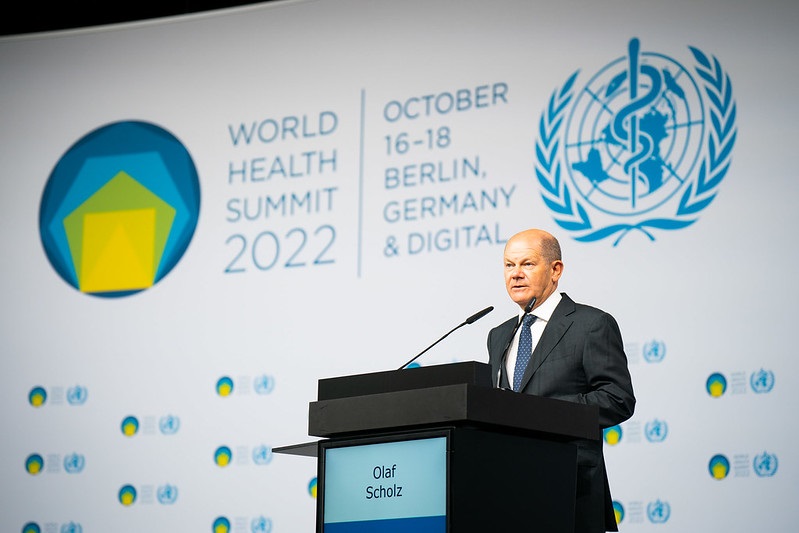
One common thread running through these themes is their relevance in the context of the United Nations’ Sustainable Development Goals (SDGs), which outlines political and economic measures needed to improve the world’s health and well-being, eradicate poverty, hunger and sustain economic growth by the year 2030.
The coronavirus pandemic was a literal touchstone (some say “the elephant in the room”) for many a discussion panel, with it having driven innovation and collaboration as well as helping drive the Digitalization in the delivery of healthcare.
However, its untoward effects on the disruption of the diagnosis, treatment and care of other disease entities were also highlighted, given the widespread lockdowns and the diversion of resources to fighting the pandemic.
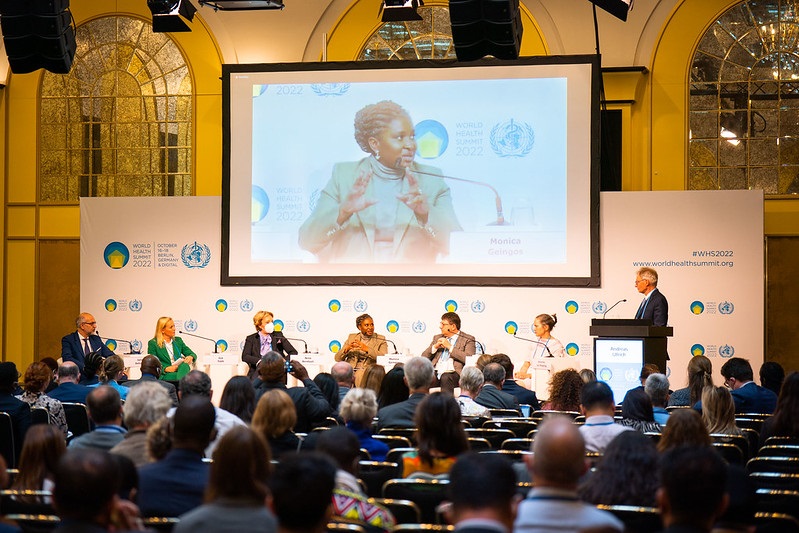
During his opening address, German Chancellor Olaf Scholz emphasized the need for governments to act in a concerted way in regard to pandemic preparedness, eschewing a siloed approach to combating pandemics. If anything, he said, the coronavirus pandemic has demonstrated to all how intertwined and interconnected our world has become.
He reaffirmed Germany’s commitment to improving global health, with the government committing 3.5 % of its gross domestic product to research and development (R&D) by the year 2025 (for context Britain and France contribute 1.7 and 2.2% of their GDPs respectively to R&D). He also noted Germany’s financial and other contributions which include 850 million euros for vaccines to nations in Africa and the Middle East; 1.3 billion euros to the Global Fund on HIV/AIDS, malaria and tuberculosis and 35 million euros in 2022 to the Global Initiative on Polio Eradication.
The Chancellor’s speech was interrupted by climate activists, who set off a fire alarm that prompted the intervention of security agents and police. The protesters claimed the government has not prioritized efforts to combat the ill-effects of climate change. But the summit went on otherwise peacefully.
One key issue emerged from various deliberations during the summit: that the hitherto mainly “top-down approach” to public health issues has failed to deliver health dividends and that a more inclusive, “bottom-up” approach was needed, cognizant of the fact that communities are better placed to correctly identify problem areas in their society, posing the right research questions, and determining the policy implementation that matters most to them.
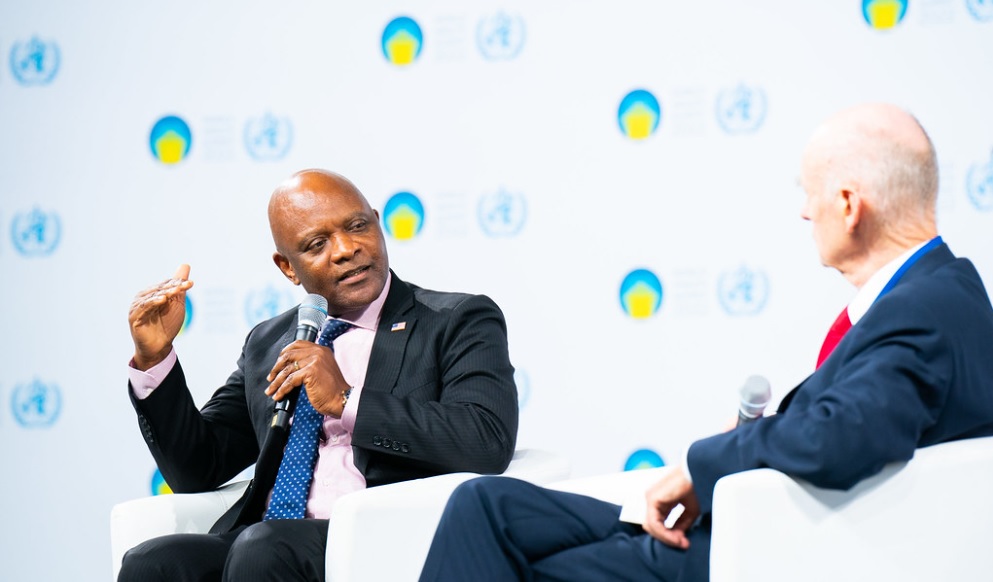
One session that caught the attention was one that looked at “the Role of Parliamentarians in Moving the Global Health Agenda forward”. It is well documented that research findings are normally left to gather dust following publication, with implementation of findings taking on average 17 years to be implemented.
One reason that has been advanced for this is the fact that there is suboptimal communication between researchers and policy-makers. In an effort to bridge this gap, panellists proposed ways to bridging the gap between scientists and bureaucrats, urging both parties to bridge the gap in communication.
Reflecting on her experiences as a parliamentarian in the Ghanaian National Assembly, the Right Honourable Sena Akua Dansua, who chaired the session, recounted the difficulties she went through, first on the opposition benches and on the side of the governing party. She noted that law-making requires dialogue and compromise in order to balance competing and sometimes disparate cross-party and internal party views and that change in the “right “direction was incremental and accrues over years.
WHO director-general, Dr Tedros Adhanom Ghebreyesus, made an impassioned plea to nations to prioritize the health and wellbeing of its citizens in public policy-making. He praised Germany for hosting the event and for its financial and other contributions in global health.
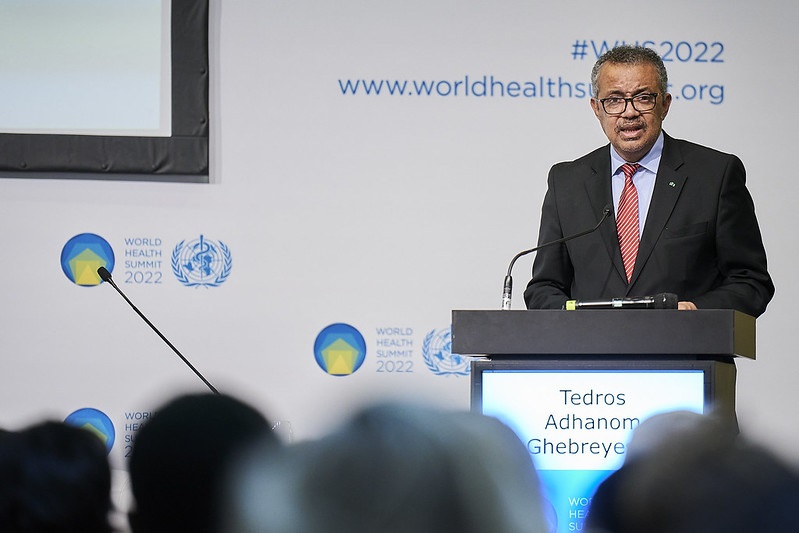
In setting the agenda of the summit, Dr Tedros, as he is fondly called, a former minister of health in his native Ethiopia, enjoined governments to “make health a political choice”, and see it as an investment in people rather than costs to be borne. Germany remains, along with Japan, the US and the Republic of Korea, one of the world’s biggest donors to the WHO.
Although global health is, in the main, about improving health systems and healthcare delivery in low- and medium-countries, benefits do accrue to high-income countries as well, since they learn from their colleagues from the Global South in interactive sessions; furthermore, insights are also gained in the area of migrant health in a world that continues to experience mass migration to the Northern Hemisphere as people search for greener pastures, carrying along with them, as it were, their own distinct health and cultural challenges.
In his address to the summit, Germany’s health minister, Karl Lauterbach, underscored the need on the part of government to show a sense of urgency in cross-border efforts to combat emergent health threats. Against the backdrop of our coexistence and dependency with animals – and with it the spectre of zoonotic diseases always lurking – he averred that indeed, “outbreaks were mandatory, but pandemics were optional”.
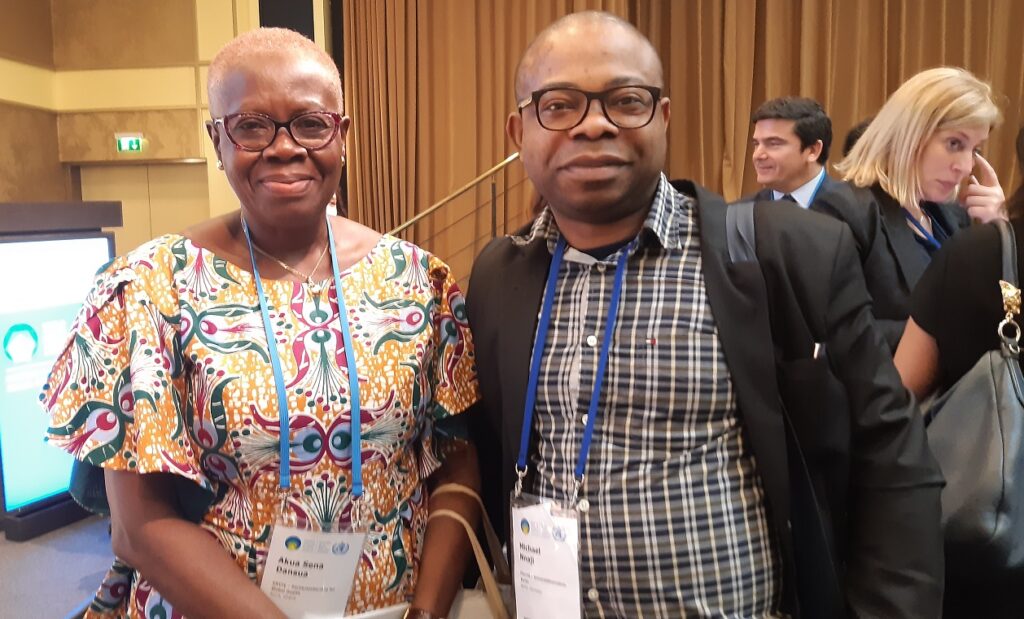
The ongoing war in Ukraine, with displaced individuals and disrupted ecosystems served as a backdrop of illustrating the urgent need to build resilient health systems and to place public health at the core of public policy. This would not only increase productivity but also substantially reduce mortality and morbidity in the population.
There was a special session on polio which still endangers millions of children in the world especially in low- and middle-income countries despite the availability of effective vaccination and near eradication in other parts of the world. The session was hosted by the Global Polio Eradication Initiative which is coordinated by the WHO.
On the eve of the Summit, the Cameroonian-American virologist Dr John Nkengasong was recognized for his outstanding achievements in global health with the inaugural Virchow Prize. Instituted by the German government, it recognizes outstanding achievements in global health and is endowed with 500,000 euros.
The Virchow Prize is awarded to those who “dedicate their lives to improving the health and well-being of the world’s most vulnerable people”.
Nkengasong, formerly director of the Africa Centre for Disease Control and Prevention, coordinated efforts to combat the coronavirus pandemic in Africa. He is currently serving as the US Global AIDS Coordinator and Special Representative for Health Diplomacy.
With the predominantly youthful outlook of the summit, the youths of the world made their presence felt. They called on global health leaders to re-examine their approach to solving public health issues and to include the youth in policy-making, especially as it pertains to their own future.
Underscoring the need to engage the youth on critical decision-making processes, the ebullient and charismatic Malawian global health activist, Maziko Matemvu, opined that young people were better placed to solve many of the myriad challenges in the global health arena in view of the fact that they were critical stakeholders and owing to the modern democratization of the knowledge base.
Remotely, prominent political heavyweights like former UK Prime Minister, Gordon Brown, and former Liberia president, Ellen Johnson Sirleaf, joined the discussions and lent their voices to call for action and leadership going forward.
The next edition of the World Health Summit is scheduled to take place in Berlin between 15 and 17 October 2023.
Nnaji, works as a physician and academic researcher at the Charité Universitätsmedizin, Berlin
 THE AFRICAN COURIER. Reporting Africa and its Diaspora! The African Courier is an international magazine published in Germany to report on Africa and the Diaspora African experience. The first issue of the bimonthly magazine appeared on the newsstands on 15 February 1998. The African Courier is a communication forum for European-African political, economic and cultural exchanges, and a voice for Africa in Europe.
THE AFRICAN COURIER. Reporting Africa and its Diaspora! The African Courier is an international magazine published in Germany to report on Africa and the Diaspora African experience. The first issue of the bimonthly magazine appeared on the newsstands on 15 February 1998. The African Courier is a communication forum for European-African political, economic and cultural exchanges, and a voice for Africa in Europe.


















